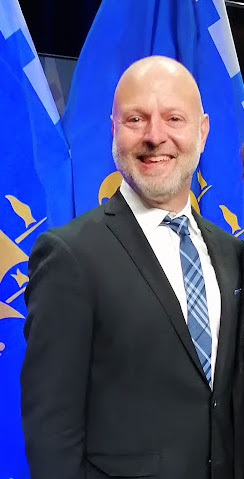Ruby Pratka
ruby@qctonline.com
Local Journalism Initiative Reporter
David Weiser has devoted the last five years of his life to bringing people together. In 2018, as the city marked the first anniversary of the shooting at the Centre culturel islamique de Québec and mourned the victims of a disturbingly similar attack at a Pittsburgh synagogue, he co-founded the interfaith group Unité Québec. Early in the COVID-19 pandemic, he worked with community organizations on the SOS Ensemble Québec initiative, co-ordinating food aid.
“I was fortunate to discover, relatively late in life, how amazing it is to contribute to community,” said Weiser, a Quebec City native
who has worked in the video game industry and served as president of the Beth Israel Ohev Sholom English-speak- ing Jewish congregation.
On Nov. 7, under the banner of Équipe Marie Josée Savard, Weiser was elected city councillor for the Plateau district. On Nov. 17, Mayor Bruno Marchand appointed him to the executive committee as an associate member responsible for immigration, cultural communities and relations with the English- speaking community. He said he was excited to work on files that reflect “why [he] got into politics.
“The [Labeaume] administration really developed a whole approach to diversity, and I’d like to make sure the current administration continues in that vein with projects like the Maison Pollack. I’d also like to sit down with [city diversity consultant] Irena Harris and establish a plan for the next year and then for the next four years,” said Weiser. He also plans to reach out to Voice of English-speaking Québec, the Morrin Centre and the parties involved in the English “superschool” project to “figure out what we can do to make sure [anglophones] feel part of the Quebec City community.
“Part of the process is meeting with community organizations, trying to get the lay of the land, starting conversations with individual citizens and connecting with as many people as possible,” he said. “The other thing is to organize events for the general public and invite
people from different cultural communities. If you bill something as an intercultural event, only people who are already interested in cultural diversity will come.” Weiser recalled that when he volunteered to distribute food early in the pandemic, volunteers from the Muslim community worked alongside volunteers who had never met a Muslim. “There were people there who had never spoken to a woman who wore a hijab; at first they were apprehensive and now they’re best friends,” he remembered. “When people have a common objective, they come together.”
Weiser’s district, Le Plateau, is among the city’s most diverse. According to data from the 2016 census, nearly 17 per cent of residents were born outside Canada.
The district is increasingly representative of Quebec City as a whole. “The city has changed; it’s no longer the Village d’Astérix, and I think people are realizing that,” Weiser said. The municipal election campaign itself, with multiple parties presenting candidates from religious and ethnic minorities, was “a win all around” for the visibility of diversity in the city.
“Mayor Marchand mentioned in his [inaugural] speech that he attached a lot of importance to vivre- ensemble,” Weiser added. “Vivre-ensemble means getting people to participate in our society together. I’m really looking forward to seeing what that will look like.”

 Coun. David Weiser was appointed associate member of the executive committee responsible for diversity, immigration and relations with the English- speaking community. Photo by Peter Black from QCT archives
Coun. David Weiser was appointed associate member of the executive committee responsible for diversity, immigration and relations with the English- speaking community. Photo by Peter Black from QCT archives